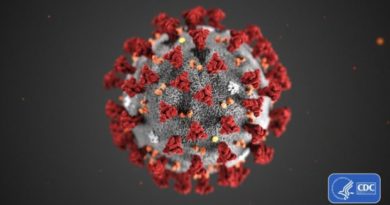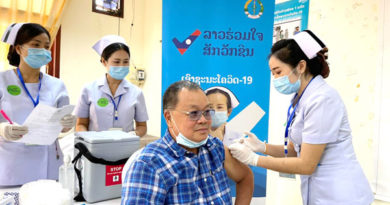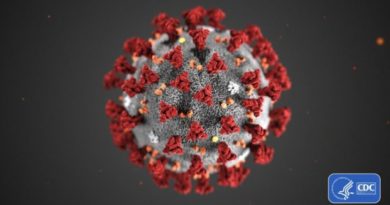HEALTH-OPINION: CANCER – Overcoming myths and mystifications around cancer
I AM sure I am not alone in being concerned about the perpetuation of misinformation that some apparently reputable cancer research organisations present on their websites in a list of what they call “Cancer Myths” that then gets recycled in media around the world, including our local press. My concern is that these supposed myths are mystifications propagated by vested pharmaceutical interests which are not in the best interest of those diagnosed with cancer.
Just to be clear, I am a social scientist, not a medical doctor, and as a human development consultant for the last 30 years, I have taken a collaborative and holistic client-centred approach to mental health and physical wellbeing. Since 2011, I continue to work with a community of cancer survivors in Malaysia, as a voluntary wellbeing coach. I am writing to add to what I see as a much needed collaborative dialogue on this evocative subject that is estimated to touch one in four people in Malaysia.
It is clear that health professionals involved in caring for patients diagnosed with cancer have a challenging task in dealing effectively with cancer. Simultaneously, people diagnosed with cancer are faced with an emotional and financial roller coaster as they grapple with major decision making in an overwhelming and confusing environment of information. Most of us are not equipped with the skills to deal with such decisions. And panic, as I have seen firsthand, can make people grasp at straws.
So in preventing and in enabling healing from cancer as individuals and as a society, where is there hope and what is promising for the future? And what is the role of physicians? Here, as in all problem solving, we need to come back to the question of what causes cancer; what promotes cancer, what is current practice and what can be done to support a return to health and wellbeing.
Myths defined by allopathic medicine
First of all, it is misleading to define the idea that “Sugar feeds cancer” as a myth or false belief without acknowledging that it is defined as such by allopathic medicine, ie mainstream medical use of pharmacological agents or physical interventions to treat diseases. When we widen the frame of thinking we note that all great developments in science were at first rejected by the status quo of the time and seen as wacky or worse before they were adopted as mainstream.
For example: Louis Pasteur’s radical germ theory led to life saving pasteurisation in surgery; the link between smoking and lung cancer recognised in the 1950s but only accepted more recently as a basis for restrictions on the sale of tobacco and thus lifestyle. Similarly, glyphosate used since 1974 in crop production is now established as a probable carcinogen by WHO and rejected by many European countries today. These policies are all based on sound findings relevant to this discussion.
So the question is, are such ideas as “Sugar feeds cancer” a false idea for which there is no substantial evidence whatsoever? And according to whom? People diagnosed with cancer are desperate to be empowered with information. At the very least, isn’t it important for medical professionals to keep an open mind and be curious in this critical management of our health and wellbeing? And if no conclusions can be drawn and we don’t yet know, let’s say so.
The power of belief and ownership of that belief, as we have seen above is important. Science does not stand in a vacuum of neutrality, especially when much of current research is sponsored by vested interests so the argument that science speaks the “truth” is questionable. The role of big pharmaceutical companies in defining and controlling the “cancer cure” industry is easily verified by an internet search of court cases and whistle blowers who have dared to speak out. It helps when those in the medical world are honest and acknowledge that the production of cancer drugs is a multi-billion dollar industry in which private doctors often receive commissions and one which is projected to grow exponentially into the future. Related to this is the fact that non-toxic therapies and clinical studies are often ignored, rejected or worse. Cancer charities in the West have been challenged for their links with pharmaceutical industry and the FDA for having suppressed and banned inexpensive natural health cures for cancer, many of which are well proven.
Take the breakthrough metabolic theory of Nobel Prize winner Otto Warburg in 1931 and from which it has been concluded that cancer is fuelled by high carbohydrate diets, not only or necessarily by “bad” genetics. This theory has been largely disregarded by conventional oncology ever since, but is resurging as a result of research showing positive clinical outcomes when cancer cells are deprived of their primary fuel source, glucose. To describe “sugar feeding cancer” as a myth and at most a limitation useful to minimise obesity, is to ignore these findings and thus the potential for healing through eliminating sugar completely from one’s diet.
Is cancer man-made?
Another so called myth is the idea that “cancer is manmade”, which is particularly odd, given the ample evidence that in the search for profit, we humans have exploited the planet and created sick, often carcinogenic environments. Statistics show a massive increase in cancer rates over the last 100 years of “development” now affecting almost 50% of the American population and estimated to affect one in four Malaysians by the age of 75. To suggest the increase in cancer has no causal relationship with the stressful, often toxic urban environments in which 50% of the world inhabits or the extensive processing of food is blinkered to say the least.
Causes are important and directly relate to treatment choices. Nonetheless, conventional treatment continues to rely on chemotherapy, surgery, and radiation to attack cancer cells, often to the exclusion of other complementary approaches and often with sadly uncertain health outcomes.
Cancer linked to diet and lifestyle
Pharmaceutical research shows that 90% of cancer cases are directly linked to diet and lifestyle with only 5-10% attributable to genetic defects. Such findings matter, not least because they engender hope for us to individually and collectively take action and make a difference to our health status in both the short term and the long term. Building on Otto Warburg’s radical metabolic based theory for example, integrative oncologists and nutritionists have developed an innovative, metabolic-focused nutrition protocol that has been proven to work. This example is indicative of a growing number of integrative oncologists who are collaborating with nutritionists and other specialists to explore how to manage holistic aspects of wellbeing that are crucial to preventing and managing cancer such as epigenetics (the study of processes which are not heritable), the immune system, toxin exposures, and blood sugar balance. This heavily researched and tested, non-toxic and metabolic focused nutrition approach extends beyond a diagnosis of cancer to deliver the hope of wellbeing for everyone. Unfortunately, the easiest way to dismiss such a promising approach is to declare it is a myth that sugar and diet do not play a role in the cancer equation.
We live in exciting and uncertain times and if we are serious about overcoming the escalating challenge that cancer and the other “modern” diseases present us, we must reframe the paradigm in which we think about them. We need governments to make tough decisions to radically change food production for health and not for profit, ensure we have a sustainable Ministry of Health and Wellness, aimed at enhancing quality of life for all, going beyond the pharmaceutical alleviation of sickness. Let’s collaborate to pay attention to what works and what doesn’t as a society. This is certainly challenging and has implications for education, medical approaches and empowerment of the people.
Holding empowering beliefs about life
Beliefs matter. Community support groups demonstrate that the emotional and social interactions in such groups generate positive outcomes. For example, in every group of 20 cancer survivors with whom I work, there are four to five exceptional upbeat participants who hold empowering beliefs about life and health and massively influence the others. Oncologist Dr Bernie Siegel focused his attention on such exceptional patients who often defied the odds to lead long and healthy lives. Since 1978 he has coached thousands of cancer patients in adopting that “exceptional” approach to life, with similarly impressive results. Therein lies a wellness model, a blueprint for all of us to adopt.
This counters the view, often presented by the allopathic medical world that beliefs, emotions, food and lifestyle are only adjuncts to any medical prescription, and, unlike Hippocrates’ view, that these are in fact centre stage in the resolution of health issue and offer the basis of wellbeing. Mainstream medical training involves very little time on nutrition and the psychology of wellbeing, which can limit medical practice to a very technical approach to physical health that does not necessarily include knowledge of important advancements in related holistic fields.
Yes, there have been incredible developments in the medical field, some of which are helping address some cancers effectively, and what must also be appreciated is that there are also amazing advancements and research which are being ignored or dismissed as anecdotal.
We talk about disruption in the business world. When disruptive findings appear in the health world they are often dismissed as anecdotal and thus insignificant. Nonetheless, I am sure many doctors will actually agree that providing only a narrow technical route towards a cancer “cure” is actually a myth with massive and devastating consequences. As an enormous amount of money is poured into this route, other promising routes are denied funding or worse, black listed or suppressed.
Meanwhile, I propose that our primary task in eliminating the scourge of cancer is to keep an open mind to research what really works and acknowledge what doesn’t work via open and informed dialogue across different disciplines and research fields and between patients and professionals.
After all, as exceptional survivors of cancer show us again and again:
“Health does not come from medicine. Most of the time it comes from the peace of mind, heart and soul, it comes from laughter and love.”










